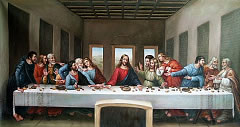Passover
Do not let anyone judge you with regard to a religious festival ... these are a shadow of the things that were to come; the reality, however, is found in Christ.
~ Colossians 2:16-17
Jesus Christ died at Passover. Perhaps if Jesus’ sacrifice were remembered by Christians at the Jewish Passover every year the church might have had more success in reaching Jews with the good news of their Messiah. In addition, the church would have been edified by understanding the roots of their faith and the riches of the grace of God in His purposes for Israel.
About 300 years after Jesus, Christianity changed from being the faith of an oppressed minority into the religion of a triumphant empire. The Roman emperor Constantine became a Christian and the church moved to a place of partnership and power in the political order.
Soon after this a teaching developed that God had replaced Israel with the church. The Jews were no longer a chosen people, it seemed.
New festivals were decreed. Christmas was established, as a supposed date for the birth of Christ. However, in the mountains of the Bethlehem area it is too cold in late-December to have flocks under the stars by night, as the New Testament relates, so this was certainly not the time of Jesus’ birth. The European mid-winter date for Christmas was selected to draw pagans away from their festivals. Symbols, such as Christmas trees and, later, Santa Claus, have pagan origins.
... the sooner Christians do away with observing the rituals of Christmas and Easter the better.
In like manner, Passover was rejected as a memorial date for the death and resurrection of Christ, precisely because it was Jewish. A new calendar around the worship of Aostre or Ishtar – hence Easter – was ordained. Modern-day elements, such as bunnies and eggs, are fertility symbols, again of pagan origin.
It is small wonder that the Bible says, about ritualistic observances:
For these reasons the sooner Christians do away with observing the rituals of Christmas and Easter the better. The birth of Jesus Christ, and especially His death and resurrection, should be celebrated daily in the heart of every believing Christian.
Turning the annual Jewish Passover into a substitute for Easter is not an option, but understanding how Jesus fulfilled the types and shadows in the Passover is instructive for the life of faith in Jesus Christ.
Continues with ...


